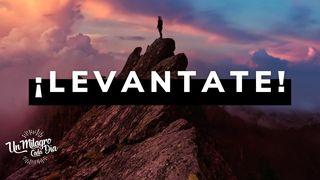Celebration through Stewardship: A 14 Day JourneyMuestra

Our Portion
The economic imagery in this passage demonstrates the critical connection that exists between faith and finances (cf. Mt 6:21). After reflecting on his own poverty in Lamentations 3:17, the poet turns his attention to God, his "portion" (La 3:24). The term portion in ancient Israel carried an economic significance easily lost on modern readers. The word has its origin in the distribution of the promised land among the 12 tribes as their inheritance from God. For an ancient Israelite, the totality of life, economic status and social security were tied to the land God had given him.
The priests received no inheritance of land. Instead, God said to Aaron, "I am your share [portion] and your inheritance" (Nu 18:20). This is the same share the writer of Lamentations claims for himself, depending absolutely on God for his safety and security. He does not overlook the fact that human beings find security in possessions. God, after all, gave us the desire to possess, and the writer is not ashamed to appeal to that desire. But instead of merely refusing to trust in resources and possessions as his refuge, the poet relocates his resources by clinging to God as his chosen portion.
How do we claim God as our portion and eternal security? According to Jesus, we can relocate our wealth by sharing with the needy. This is how we store up for ourselves lasting treasures in heaven (see Mt 6:19-21; Lk 12:32-34; Ti: 6:17-19).
"Can you say with John Wesley, 'I have all things only by the price they will bring in eternity?'" challenges National Christian Foundation cofounder Terry A. Parker. "Do you get excited about investing the time, talent, and resources God has given you this day, so on that day you will hear Him say, 'Well done good and faithful servant?'"
In the words of John Nunes, a pastor, theologian and the president of a denominational relief agency, "As God's redeemed people, we have the calling--and opportunity--to be openhanded and tenderhearted toward those in need, not hard-hearted and tightfisted..." Nunes continues, "David Belasic suggests that God is favorably biased toward the poor, toward those who are suffering, toward those who have been shattered by the vicissitudes of life. God cares. His people care too.
"Many Christians are going to be ashamed to face the Lord and explain why they hoarded money while others went hungry," predicts Christian financial stewardship leader Larry Burkett (1939-2003). "Once commitment has been made to a disciplined lifestyle, regardless of the available income, the danger of greed and its by-products is significantly reduced."
While reading today's passage please think about the following questions: What changes in your life when you make God your portion (your security and inheritance)? How will you feel when you face God and think back about the times you had opportunity to give to others and didn't? What can you do to share with others today?
The economic imagery in this passage demonstrates the critical connection that exists between faith and finances (cf. Mt 6:21). After reflecting on his own poverty in Lamentations 3:17, the poet turns his attention to God, his "portion" (La 3:24). The term portion in ancient Israel carried an economic significance easily lost on modern readers. The word has its origin in the distribution of the promised land among the 12 tribes as their inheritance from God. For an ancient Israelite, the totality of life, economic status and social security were tied to the land God had given him.
The priests received no inheritance of land. Instead, God said to Aaron, "I am your share [portion] and your inheritance" (Nu 18:20). This is the same share the writer of Lamentations claims for himself, depending absolutely on God for his safety and security. He does not overlook the fact that human beings find security in possessions. God, after all, gave us the desire to possess, and the writer is not ashamed to appeal to that desire. But instead of merely refusing to trust in resources and possessions as his refuge, the poet relocates his resources by clinging to God as his chosen portion.
How do we claim God as our portion and eternal security? According to Jesus, we can relocate our wealth by sharing with the needy. This is how we store up for ourselves lasting treasures in heaven (see Mt 6:19-21; Lk 12:32-34; Ti: 6:17-19).
"Can you say with John Wesley, 'I have all things only by the price they will bring in eternity?'" challenges National Christian Foundation cofounder Terry A. Parker. "Do you get excited about investing the time, talent, and resources God has given you this day, so on that day you will hear Him say, 'Well done good and faithful servant?'"
In the words of John Nunes, a pastor, theologian and the president of a denominational relief agency, "As God's redeemed people, we have the calling--and opportunity--to be openhanded and tenderhearted toward those in need, not hard-hearted and tightfisted..." Nunes continues, "David Belasic suggests that God is favorably biased toward the poor, toward those who are suffering, toward those who have been shattered by the vicissitudes of life. God cares. His people care too.
"Many Christians are going to be ashamed to face the Lord and explain why they hoarded money while others went hungry," predicts Christian financial stewardship leader Larry Burkett (1939-2003). "Once commitment has been made to a disciplined lifestyle, regardless of the available income, the danger of greed and its by-products is significantly reduced."
While reading today's passage please think about the following questions: What changes in your life when you make God your portion (your security and inheritance)? How will you feel when you face God and think back about the times you had opportunity to give to others and didn't? What can you do to share with others today?
Escritura
Acerca de este Plan

The words celebration and stewardship are rarely connected. Perhaps that’s because we tend to think about stewardship as giving away rather than caring for—or even enjoying. Through this plan’s daily Bible passage and devotional content, you’ll begin to understand how intentional stewardship springs from—and even leads to—celebration.
More
We'd like to thank The Stewardship Council, creators of the NIV Stewardship Study Bible, for the structure of Celebration through Stewardship: A 14 Day Journey. For more information about this plan, the NIV Stewardship Study Bible, or hundreds of stewardship resources, please visit their site at http://www.stewardshipcouncil.net/
Planes relacionados

Palabras Finales De Jesús

Semana Santa

Siete Lecciones Que Podemos Aprender De Los Israelitas Y Su Viaje Por El Desierto

Siete Tipos De Reposo Sabático Para Nuestra Cultura Moderna

Compartir tu Fe con Amigos y Familia: Una Guía Práctica

¡Levántate! 7 Claves Para Levantarte Y Seguir.

Dios en Medio de la Depresión
